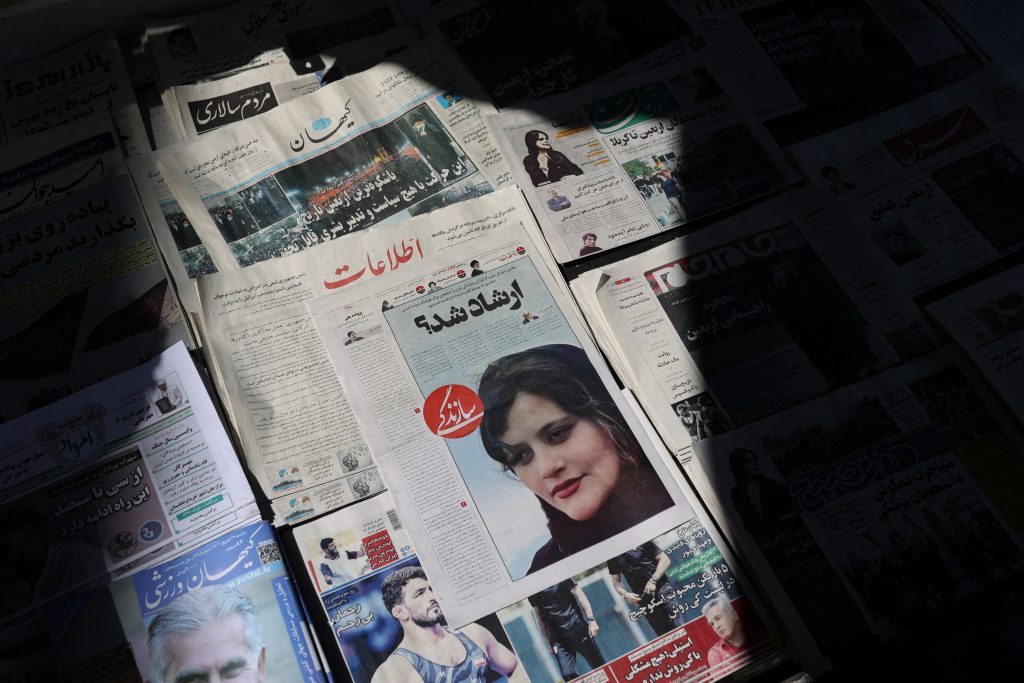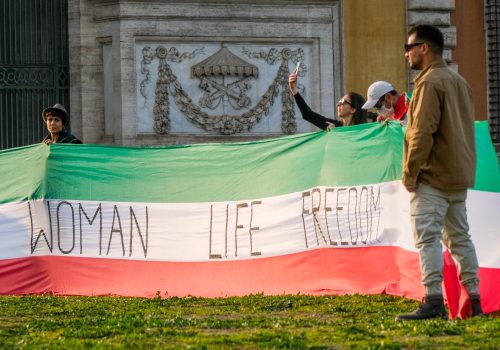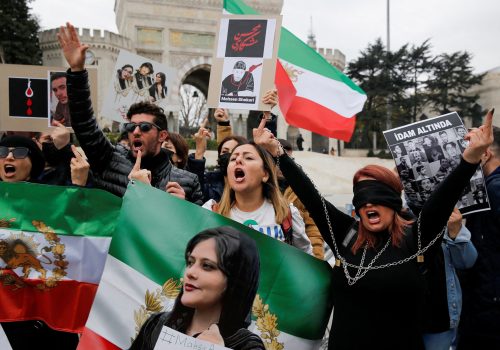به زبان فارسی بخوانید
طی سال گذشته، وضعیت زنان در ایران به طور فزایندهای در سطح جهان مورد توجه و بررسی قرار گرفته است. در سپتامبر 2022 مهسا امینی در اثر آسیبهایی که توسط «پلیس اخلاقی» حکومت ایران به وی وارد شد، جان خود را از دست داد ، و این واقعه یک جنبش اعتراضی به رهبری زنان را به راه انداخت که به سرعت از اعتراض علیه قوانین حجاب اجباری به اعتراض علیه حکومت جمهوری اسلامی ایران تبدیل شد. از آن زمان به بعد بیش از پانصد معترض کشته شدهاند و تقریباً بیست هزار تن دستگیر شدهاند که در میان آنها بسیاری از زنان روزنامه نگار دیده میشوند. گزارشهای نگران کنندهای از جنایات جنسیتی، از جمله آزارهای جنسی و شکنجه اعتراض کنندگان به دست نیروهای امنیتی ایران نیز آشکار شدهاند. همانطور که مسیح علینژاد، روزنامهنگار و فعال حقوقی و نیز دیگران توصیف کردهاند، زنان در ایران تحت یک نوع سرکوب شدید و سیستماتیک زندگی میکنند که شبیه «آپارتاید جنسیتی» است. اکنون دختران مدرسهای در سراسر کشور به نوعی بیماری دچار شدهاند که بسیاری معتقدند مسموم نمودن عمدی آنها برای بستن مدارس دخترانه به منظور انتقام گرفتن از آنها برای شرکت شان در تظاهرات است.
یکی از مؤسسات اصلی در پس سرکوب سیستماتیک زنان، شورای عالی انقلاب فرهنگی است، ارگانی انتصابی که فقط در برابر رهبر انقلاب، علی خامنهای پاسخگو است. در واقع شورای عالی انقلاب فرهنگی بود که در دوران رئیس جمهور اسبق، محمود احمدی نژاد، پلیس اخلاقی را پیش از هر چیز تأسیس نمود. ماهها پیش از مرگ امینی، رئیس جمهور ابراهیم رئیسی که خود در سال 2019 توسط ایالات متحده امریکا تحریم شد و اکنون ریاست شورای عالی انقلاب فرهنگی را بر عهده دارد، به پلیس اخلاقی و نهادهای دولتی در سراسر کشور دستور داد قوانین حجاب اجباری را با سختگیری بیشتری به اجرا درآورند، سیاستی که توسط شورای عالی انقلاب فرهنگی تصویب و طراحی شده بود. علیرغم شواهد فزاینده از آزار و اذیتهایی که در ارتباط با اعتراضات صورت گرفته، شورای عالی انقلاب فرهنگی در ماه ژانویه حمایت خود را از حجاب اجباری تکرار کرد. در همان ماه یک دبیر جدید برای شورای عالی انقلاب فرهنگی برگزیده شد، و این فرد، کسی است که شخصاً خانمهایی که به تشخیص او حجاب نامناسب داشتند، را با تیرکمان میزده است و در دوران اخیر نیز اصرا میورزید که نباید به معترضان «هیچگونه رحمی» نشان داد و باید آنها را به صلابه کشید.
متأسفانه پاسخگو نمودن شورای عالی انقلاب فرهنگی دشوار است. این ارگان یک نهاد غیر انتخابی است و در کشوری قرار دارد که خارج از دسترسِ شیوههای سنتی پاسخگو نمودن در برابر قانون، از قبیل دادگاههای بینالمللی است و مرتباً هم از همکاری با ساز و کارهای تخصصی حقوق بشر سر باز میزند. شورای حقوق بشر سازمان ملل اخیراً یک هیئت حقیقتیاب در مورد ایران تشکیل داد که مأموریت آن، جمع آوری، منسجم نمودن، و تحلیل شواهد و مدارک نقض حقوق بشر است که از اعتراضات سرچشمه گرفتهاند، اما این هیئت به تنهایی قدرتِ آغازِ هیچگونه دادرسی حقوقی را ندارد. با توجه به این محدودیتها، تحریمها و به ویژه تحریمهای هدفمند گامی به جلو در جهت متوجه ساختن عموم نسبت به آزار و اذیتهای مداوم جنسیتی میباشند.
دولتها از تحریمهای هدفمند برای مسدود کردن داراییهای مرتکبین نقض حقوق و ممنوع کردن آنان از دریافت ویزا استفاده میکنند. این شیوهها در اصل به عنوان ابزاری برای تشویق مرتکبین نقض حقوق به تغییر رفتار بوده و بر اساس این تئوری صورت میگیرد که مرتکبان مزبور به منظور پس گرفتن داراییهای خود و توانایی انجام مسافرت، از انجام فعالیتهایی که قابل تحریم هستند، دست خواهند کشید.
تحریمهای هدفمند از دهۀ 1990 به کار گرفته شدهاند. اما استفاده از آنها برای مبارزه با موارد نقض حقوق بشر و فساد برای نخستین بار در سال 2012 و در پاسخ به مرگ افشاگر روسی و وکیل مالیات به نام سرگی ماگنیتسکی در سال 2009، آغاز شد. ماگنیتسکی پس از آنکه یک مورد فساد مالی بسیار بزرگ را افشا نمود، در زندان روسیه تحت شکنجه قرار گرفت و جان باخت. پس از مرگ ماگنیتسکی، موکل وی، بیل براودر شروع به دادخواهی از جانب او نمود. اگرچه براودر نتوانست راههایی برای پاسخگو نمودن کیفری افراد در روسیه یا در کشورهای دیگر پیدا کند، اما متوجه پیوندِ میان فساد مالی و نقض حقوق بشر شد و متوجه شد بسیاری از افرادی که طراحِ هر دوی این موارد هستند، درآمدهای حاصل از این مسیرهای نامشروع را در کشورهای غربی خرج میکنند. حوزههای قضایی، از جمله ایالات متحدۀ امریکا، کانادا، بریتانیا، اتحادیۀ اروپا، و استرالیا شیوههایی را اتخاذ نمودهاند که اغلب از آن به عنوان تحریمهای سبک ماگنیتسکی یاد میشود تا اجازه ندهد مرتکبین این جنایات از اینگونه تجملات لذت ببرند، حتی اگر این افراد، دست نیافتنی باشند.
در شرایط مطلوب، ایالات متحدۀ امریکا، کشورهای همفکر، و کشورهای بلوکهای منطقهای از قبیل اتحادیۀ اروپا همگی، هم شورای عالی انقلاب فرهنگی و هم اعضای آن را [به عنوان مرتکبین نقض حقوق] شناسایی خواهند کرد. اگرچه نهادها اغلب در خارج از مرزها دارایی ندارند، و طبیعتاً نمی توانند ویزا دریافت کنند، اما اعضای آنها اغلب دارای پیوندهای بینالمللی هستند. تعیین نهادها به عنوان عامل جرم به طور خودبه خودی سبب نمیشود که اعضای آن نیز به عنوان عامل جرم شناخته شوند اما عبارات موجود در قوانین مربوطه در بیشتر اوقات به گونهای بیان شدهاند که هر یک از اعضاء نیز بر طبق معیارهای عنوان شده، مشمول این قانون بشوند.
مقامات حکومت ایران مقادیر قابل توجهی ثروت در خارج از کشور اندوختهاند و نیز دارای ارتباطاتی در سطح جهان هستند (مانند اعضای درجه یک خانواده شان که در خارج زندگی میکنند) که به این معناست که آنها مایلند امکان خرج کردن پول و دریافت ویزا در این کشورها را برای خود حفظ کنند. فرزندان این مقامات عالیرتبه که گاهی اوقات «آقازاده» نامیده میشوند غالباً برای نحوۀ زندگی تجملاتی خود، مورد انتقاد قرار میگیرند تا جایی که حتی این جریان موجب ساختن یک سریال تلویزیونی پر طرفدار در ایران شده که بر روی این افراد تمرکز دارد. تحریمهای هدفمند تمام داراییهایی که به نام مقامات مزبور وجود دارد را مسدود خواهد کرد و به طور کلی آنها را از داشتن معاملات در سیستمهای بانکی در کشورهای تحریم کننده (مثلاً ارسال پول به اعضای خانواده) و یا دریافت ویزا (مثلاً برای دیدار اعضای خانواده) ممنوع خواهد کرد. بخصوص با توجه به گزارشهایی که از استعفاهای گروهی در میان برخی از مقامات حکومتی و اعضای نیروهای امنیتی میرسد، تحریمها ممکن است مشوقی برای اعضای شورای عالی انقلاب فرهنگی باشد تا حد اقل از سمتهای دولتی خود استعفا دهند.
حتی اگر تحریمهای هدفمند کامل انجام بشوند، هنوز به آزار و اذیتهای جنسیتی پایان نخواهند داد. علیرغم تحریمهای جهانی موجود (چه هدفمند و چه غیر از آن)، حکومت ایران هنوز رفتار خود را به نحو قابل ملاحظهای تغییر نداده است. تشخیص یک نهاد مانند شورای عالی انقلاب فرهنگی بدون داشتن دارایی در خارج از کشور و بدون تشخیص تک تک اعضای آن، تأثیر واقعی محدودی خواهد داشت. با وجود این، همانطور که هلند نیز اذعان داشته است، ارزش نمادین این اقدام را نمی توان نادیده گرفت. فواید محدودِ این اقدامات هنوز هم ارزش انجام دادن آن را دارد، بخصوص هنگامی که این وضع مربوط به جنایات جنسیتی میشود. نخست آنکه این تحریم به اعضای شورای عالی انقلاب فرهنگی اخطار میدهد که جامعۀ بینالمللی از مشارکت آنها در جرم آگاه است و اَعمال آنها را زیر نظر دارد. دوم اینکه تحریم کننده به قربانیان سیاستهای شورای عالی انقلاب فرهنگی، که در این مورد، زنان میباشند، حمایت خود را ابراز میکند. در تحریمهای هدفمندی که تا کنون انجام شده، چنین حمایتی وجود نداشته است، و گروههایی از قبیل «هیومن رایتس فرست» (Human Rights First) مواردشناسایی شده در این تحریمها را مورد تجزیه و تحلیل قرار دادند و دریافتند که در بیشتر مواقع حوزههای قضایی جنسیت قربانی را مورد توجه قرار ندادند اما هنگامی که این کار را انجام دادند هم بیشتر احتمال داشت که هویت مردها را شناسایی کنند تا هویت زنان.
ایالات متحده امریکا صدها تن از مقامات رسمی ایرانی را در بیش از دهها مورد قوانین تحریمِ مخصوص ایران، شناسایی کرده است. تا کنون ایالات متحده، بریتانیا، کانادا، استرالیا و اتحادیۀ اروپا تحریمهای هدفمندی را در مورد پلیس اخلاقی و نیروهای امنیتی اِعمال نمودهاند، اما هنوز این تحریمها در مورد شورای عالی انقلاب فرهنگی اجرا نشده است. اگرچه شناساییهایی که تا کنون انجام شده قدمی مثبت در راه تشخیص رفتارهایی است که ناشی از سیاستهای شورای عالی انقلاب فرهنگی است، اما این اقدامات نتوانستهاند آسیبهای خاصی را که شورای عالی انقلاب فرهنگی در ایجاد ساختار آپارتاید جنسیتی در ایران مرتکب شده است، اذعان نمایند.
متخصصین پروژۀ اقدامات قضایی استراتژیک قبلاً توصیه کردهاند که مقامات بر طبق سیستمهای تحریم هدفمند، شورای عالی انقلاب فرهنگی را در فهرست مرتکبین جرم قرار دهند و شواهدِ مؤیدِ این موضوع را به همراه استدلالهای قانونی مربوطه ارائه دادهاند. به همان اندازه که اهمیت دارد مؤسسات ناقض حقوق بشر مانند پلیس اخلاقی شناسایی شوند و در فهرست مرتکبین جرم قرار گیرند، به همان اندازه نیز تعیین شورای عالی انقلاب فرهنگی به عنوان مرتکب جرم برای شناسایی و محکوم نمودن نهادهایی که مداوماً مسئولِ ترتیب دادن جنایات جنسیتی هستند، حیاتی است و بر پشتیبانی نمودن از قربانیانِ فراوان آنها تأکید مضاعفی خواهد داشت. روز جهانی زن برای کشورها و حوزههای قضایی که دارای سیستمهای تحریم برای نقض حقوق هستند، فرصتی فراهم میآورد تا آنهایی را که مسئول طرفداری از حکومتهایی هستند که علیه زنان تبعیض قائل میشوند و سیاستهای ناقض حقوق زنان را به اجرا در میآورند، از جمله شورای عالی انقلاب فرهنگی و اعضای آن را شناسایی و در فهرست مرتکبین قرار دهد.
This past year, the situation of women in Iran has increasingly come under international scrutiny. In September 2022, Mahsa Amini died from injuries sustained by the regime’s “morality police,” triggering a women-led protest movement that quickly transitioned from protests against compulsory hijab rules to protesting the Islamic Republic of Iran itself. Since then, more than five hundred protesters have been killed and almost twenty thousand arrested, among them many female journalists. Alarming reports of gender-based crimes, including sexual abuse and torture of protesters at the hands of Iranian security forces, have also come to light. As the journalist and activist Masih Alinejad and others have described it, women in Iran live under a severe and systematic form of oppression akin to “gender apartheid.” Now, schoolgirls across the country are falling ill in what many believe are deliberate poisonings to close girls’ schools in retaliation for their participation in the protests.
One of the principal institutions behind this systematic oppression of women is the Supreme Council of the Cultural Revolution (SCCR), an unelected body answerable only to Supreme Leader Ali Khamenei. Indeed, it was the SCCR, under former President Mahmoud Ahmadinejad, that created the morality police in the first place. Months before Amini’s death, President Ebrahim Raisi, who was himself sanctioned by the United States in 2019 and who now heads the SCCR, ordered the morality police and government agencies across the country to enforce more strictly the compulsory hijab rules, a policy enacted and designed by the SCCR. Despite mounting evidence of abuses in the context of the protests, the SCCR reiterated its support for the compulsory hijab in January. That same month, a new secretary of the SCCR was appointed—one who personally used to fire a slingshot at women who he considered to be wearing their hijab improperly and, more recently, insisted that protesters should be shown “no mercy” and crucified.
Unfortunately, it is difficult to hold the SCCR accountable. It is an unelected body in a country that is beyond the reach of traditional accountability mechanisms such as international courts and routinely refuses to cooperate with specialized human rights mechanisms. The UN Human Rights Council recently established a fact-finding mission on Iran with a mandate to collect, consolidate, and analyze evidence of human rights violations stemming from the protests, but it does not have the power to initiate any legal proceedings itself. Given these limitations, sanctions—and specifically targeted sanctions—offer a way forward to address the ongoing gender persecution.
Governments use targeted sanctions to freeze perpetrators’ assets and ban them from obtaining visas. They are primarily used as a tool to incentivize behavior changes under the theory that perpetrators will abandon the sanctionable activities in order to reclaim their assets and ability to travel.
Targeted sanctions have been used since the 1990s. However, using them to target human rights violations and corruption first began in 2012 in response to the death of Russian whistleblower and tax lawyer Sergei Magnitsky in 2009. Magnitsky was tortured and died in Russian prison after uncovering an instance of massive Russian corruption. After Magnitsky’s death, his client Bill Browder began advocating for justice on his behalf. While Browder could not find paths for criminal accountability in Russia or overseas, he recognized the link between corruption and human rights abuses, and he noted that many architects of both spent their ill-gotten gains in Western countries. Jurisdictions including the United States, Canada, the United Kingdom, the European Union (EU), and Australia adopted measures, often referred to as Magnitsky-style sanctions, to prevent perpetrators of these crimes from enjoying those luxuries—even if they were otherwise untouchable.
Ideally, the United States, likeminded countries, and regional blocs such as the EU will all designate both the SCCR and its members. While entities often do not have overseas assets and, naturally, cannot receive visas, their members often do have international connections. Designations on entities do not automatically result in designations on members, but the relevant legislation is often worded such that any members would additionally meet the criteria.
Iranian regime officials are known to have considerable overseas wealth, as well as international connections (such as immediate family members living overseas) that would suggest they would want to maintain the ability to spend money and obtain visas in those locations. The children of high-ranking officials, sometimes called “aghazadehs,” are frequently criticized for their luxurious lifestyles, even prompting a hit television series in Iran focused on them. Targeted sanctions would freeze all assets in the officials’ names and would, in general, prevent them from engaging with banking systems based in the sanctioning countries (for example, to send money to family members) or from obtaining a visa (for example, to visit family members). Especially in light of reports of mass resignations among certain regime officials and members of the security forces, sanctions might incentivize SCCR members to resign from government positions, at the least.
Even if executed perfectly, targeted sanctions will not end gender persecution. Despite existing global sanctions (targeted and otherwise), the Iranian regime has not yet meaningfully changed its behavior. Designating an entity like the SCCR without known overseas assets and without designating individual members would have limited material effect. However, as recognized by the Netherlands, the symbolic value cannot be overlooked. The limited benefits are worth the effort—especially when it comes to gender-based crimes. First, it puts the SCCR’s members on notice that the international community is aware of their complicity and is paying attention. Second, it offers support to the victims of the SCCR’s policies—in this instance, women. Such support has been lacking in targeted sanctions to date, and groups such as Human Rights First have analyzed designations and found that in most instances jurisdictions did not recognize the gender of the victims, but when they did, they were more likely to identify men than women.
The United States has designated hundreds of Iranian officials across more than a dozen Iran-focused sanctions regimes. So far, the United States, the United Kingdom, Canada, Australia, and the EU have imposed targeted sanctions on the morality police and on the security forces—but not yet on the SCCR. While the designations thus far have been a positive and welcome step to address the behaviors stemming from the SCCR’s policies, they fail to acknowledge the specific harms the SCCR has committed in building the architecture of Iran’s gender apartheid.
Experts from the Strategic Litigation Project have previously recommended that authorities designate the SCCR under relevant targeted sanctions regimes and have submitted supporting evidence and legal arguments. As important as designating human-rights-violating institutions such as the morality police has been, designating the SCCR is also critical for identifying and condemning the bodies responsible for facilitating the ongoing gender-related crimes and would add additional weight in support of their many victims. International Women’s Day offers an opportunity for countries and other jurisdictions with human rights sanctions regimes to designate those responsible for upholding regimes that discriminate against women and implement the policies designed to violate women’s rights—including the SCCR and its members.
Celeste Kmiotek is a staff lawyer for the Strategic Litigation Project at the Atlantic Council.
Lisandra Novo is a staff lawyer for the Strategic Litigation Project at the Atlantic Council.
The Strategic Litigation Project works on accountability efforts for atrocity crimes, human rights violations, and corruption offenses around the world.
Further reading
Thu, Feb 23, 2023
Iran’s ‘women, life, freedom’ revolution has a manifesto. Here are the next steps.
IranSource By
Signed by twenty organizations and released on February 13, the manifesto gathered the support of many civil society organizations in Iran.
Fri, Jan 27, 2023
What will it take to deter Iran from targeting opponents inside the US?
New Atlanticist By
The US Department of Justice unsealed charges Friday in an alleged assassination plot directed by Iran against a US journalist. Our experts unpack the ongoing threat.
Thu, Dec 22, 2022
I’m a former Syrian civil society activist. Syrians can’t tell Iranians how to win, but we can share lessons we learned the hard way.
IranSource By
Be the Iran you want to see.
Image: A newspaper with a cover picture of Mahsa Amini, a woman who died after being arrested by the Islamic republic's "morality police" is seen in Tehran, Iran September 18, 2022.



